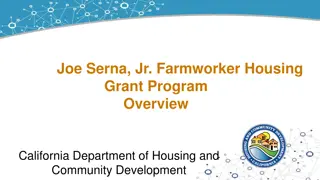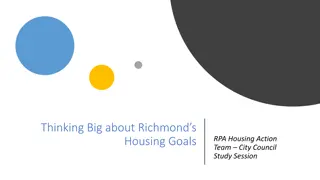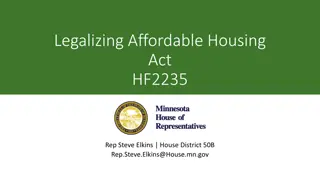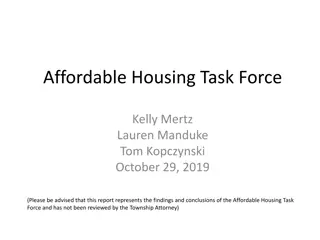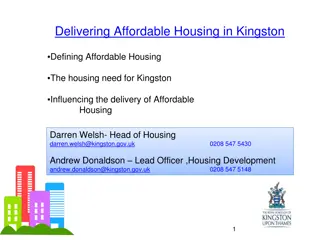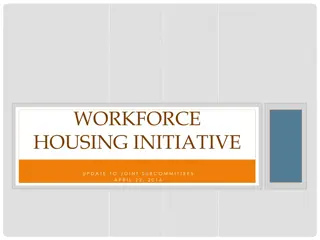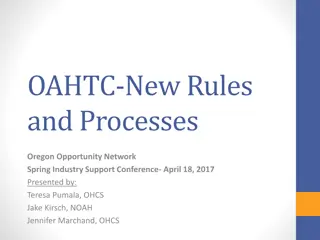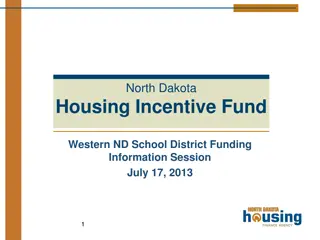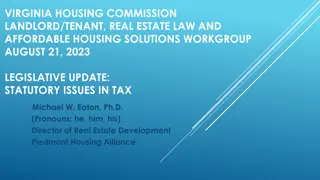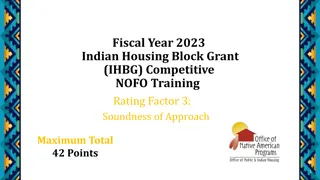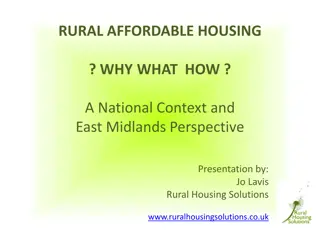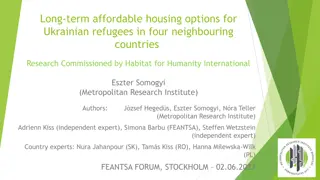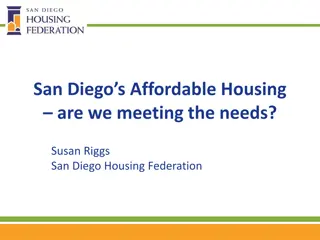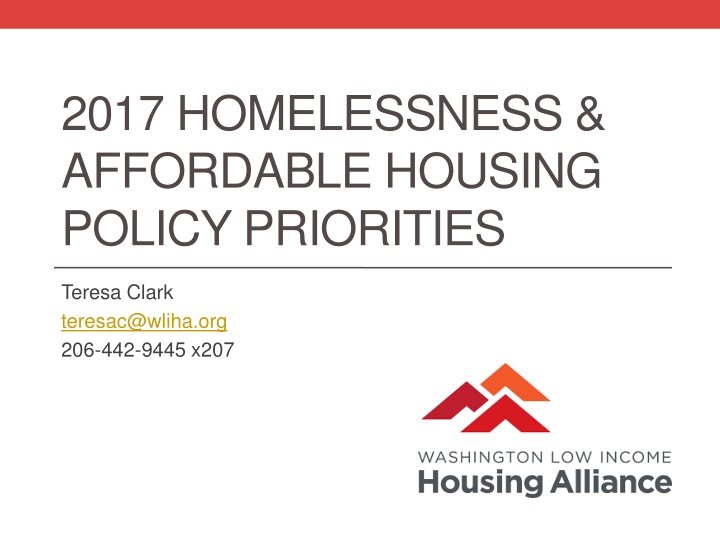
AFFORDABLE HOUSING
Teresa Clark presents the 2017 legislative agenda setting process of Housing Alliance focusing on affordable housing and homelessness policies. The agenda aims to address urgent issues, build relationships, and involve stakeholders, with goals to impact statewide, address racial/social inequity, and more.
Download Presentation

Please find below an Image/Link to download the presentation.
The content on the website is provided AS IS for your information and personal use only. It may not be sold, licensed, or shared on other websites without obtaining consent from the author. If you encounter any issues during the download, it is possible that the publisher has removed the file from their server.
You are allowed to download the files provided on this website for personal or commercial use, subject to the condition that they are used lawfully. All files are the property of their respective owners.
The content on the website is provided AS IS for your information and personal use only. It may not be sold, licensed, or shared on other websites without obtaining consent from the author.
E N D
Presentation Transcript
2017 HOMELESSNESS & AFFORDABLE HOUSING POLICY PRIORITIES Teresa Clark teresac@wliha.org 206-442-9445 x207
Overview Housing Alliance legislative agenda setting process Overview of Housing Alliance 2017 legislative agenda Housing Trust Fund Document Recording Fees Source of Income Discrimination Homelessness Safety Net Supportive Housing Services Medicaid Benefit Preparing for the 2017 legislative session
Legislative Agenda Goals The Housing Alliance believes an effective state legislative agenda meets the following goals: Has a statewide impact, Addresses racial or social inequity, Has an army" of supporters or stakeholders behind each individual ask, Has a balance of policy and fiscal asks, Addresses the spectrum of affordable housing and homelessness needs, Addresses urgent issues, Is responsive to current economic and political realities, Builds relationships, brings in partners and builds the movement Falls within the Housing Alliance s organizational mission
Legislative Agenda Setting Process Late spring/early summer: Gather member and community feedback on affordable housing and homelessness priorities (via survey) Summer: Public Policy Committee convenes to develop a draft legislative agenda http://wliha.org/about-us/public-policy-committee Fall: Housing Alliance Board of Directors approves the lead agenda http://www.wliha.org/about-us/staff-board#board
2017 Lead Agenda 1. Invest $200 million into the Housing Trust Fund 2. Prevent the cliff in state homelessness funding Eliminate the sunset on the document recording fees, Increase the document recording fee, Eliminate the 45% mandated use of state funds for one purpose, Streamline and improve state and county auditing and reporting requirements. 3. Outlaw discrimination based on a renter s source of income 4. Protect and fully fund homelessness safety net programs The Housing and Essential Needs Program, The Aged, Blind and Disabled Program, Medical Care Services, SSI Facilitation Services. 5. Ensure full Operating Budget authority for the 1115 Medicaid Waiver for Permanent Supportive Housing
Housing Trust Fund (HTF) What is the Housing Trust Fund? Primary source of state funding to build affordable housing. For every $1 in Housing Trust Fund investments, $5.5 in other resources are leveraged. Has created over 40,000 affordable homes since its creation in 1986. Not a true trust fund. What is the legislative vehicle (or ask)? The ask is for the legislature to appropriate $200 million in the state s biennial capital budget.
Unaffordable Housing Leads to Spending Less on Other Needs Monthly Spending by those in the lowest income quartile (based on expenditures): Without Affordable Housing Food: $217 Transportation: $55 Retirement: $38 With Affordable Housing Food: $350 Transportation: $158 Retirement: $76 America s Rental Housing, a report from the Joint Center for Housing Studies of Harvard University
Statewide Investments in Affordable Housing 1989 2015 Multiple Counties (scattered-site projects) 358 Units $6.7 M Whatcom 1,229 Units + 9 Beds $32 M Skagit 715 Units + 6 Beds $19.8 M Pend Oreille 152 Units $2.3 M San Juan 236 Units $9.9M Ferry 177 Units $2.6 M Okanogan 361 Units + 47 beds $9.3 M Stevens 183 Units $5.7 M Island 163 Units + 17 Beds $6.4 M Clallam 666 Units $21.7 M Snohomish 2,569 Units + 55 Beds $57.5 M Chelan 926 Units + 6 Beds $30 M Kitsap 960 Units + 80 Beds $28.2 M Douglas 150 Units + 18 Beds $9.6 M Jefferson 109 Units + 4 Beds $5 M Spokane 2,907 Units + 177 Beds $81 M Lincoln 39 Units + 16 Beds $2.5 M King 15,320 Units + 2,098 Beds $370.3 M Mason 279 Units + $8.5 M Grays Harbor 231 Units + 25 Beds $5.3 M Grant 1,390 Units + $31.4 M Kittitas 183 Units $3.7 M Adams 438 Units + $12.6 M Pierce 2,738 Units + 224 Beds $76.6 M Whitman 239 Units $9.3 M Thurston 926 Units + 88 Beds $32.4 M Pacific 68 Units + 8 Beds $6.2 M Franklin 388 Units $11.4 M Lewis 386 Units + 6 Beds $13.1 M Cowlitz 474 Units + 41 Beds $16 M Garfield 10 Units $94.1 K Yakima 1,421 Units + 108 Beds $47.6 M Benton 515 Units + 8 Beds $12.3 M Walla Walla 603 Units + 151 Beds $28.3 M Columbia 8 Units $42.3 K Skamania 142 Units $4.6 M Asotin 56 Units $1.1 M Wahkiakum 19 Units $1.1 M Klickitat 63 Units + 6 Beds $2.3 M Clark 2,036 Units + 95 Beds $42.8 M Statewide Totals: 39,833 Units + 3,293 Beds $1.1 Billion includes: HTF $946.3M + HOME $120.7M Beds refer to shelters, group-home, seasonal farmworker, barrack-style beds. Not all counties include beds. Units refer to all types of rental units such as studios, 1-bedroom, 2-bedrooms, etc. Washington State Department of Commerce
Housing Trust Fund (HTF) Who can use HTF resources to build housing? Funds are restricted to nonprofits, public housing authorities, local governments, and federally recognized tribes. How are HTF resources distributed? The Washington State Department of Commerce makes HTF funding allocations. Commerce must follow established allocation rules to make sure funding is distributed equitably in terms of geographic representation and populations served. Who is served by HTF funded housing? People with developmental, behavioral, and physical disabilities Farmworkers Veterans Seniors Youth and young adults including LGTBQ youth Communities of color Survivors of domestic violence Immigrants and refugees Families and individuals experiencing homelessness Low and moderate income workers First time homebuyers
Who is Served by the Housing Trust Fund? The overwhelming bulk of Housing Trust Fund dollars support homes for those with the lowest incomes. Over 70% are extremely low income. Slide Source: Washington State Department of Commerce.
HTF Fiscal Committees House of Representatives Capital Budget Committee State Senate Ways and Means Committee http://leg.wa.gov/legislature/Page s/CommitteeListing.aspx
Document Recording Fees (DRF) What are document recording fees? DRF are a $58 fee charged when certain real estate related documents are recorded by local county auditors. 60% distributed to counties to fund homelessness services 40% are sent to the Department of Commerce to fund homelessness programs through the Consolidated Homelessness Program (CHG). Primary source of funding for both local and state homelessness programs.
Document Recording Fees (DRF) What do document recording fees fund? Homelessness shelters, including domestic violence shelters, Youth and young adult shelters and outreach services, Short-term and longer-term rental and utility assistance, Housing application fees and move-in assistance (deposits, tenant screening fees), Permanent supportive housing services, outreach services, and housing case management services. Operation and maintenance costs of affordable housing.
Document Recording Fees (DRF) What is the legislative vehicle (or ask)? Pass a bill that makes the following changes to state law: Eliminate the sunsets of a portion of the fees, Increase the document recording fee, Eliminate the 45% mandated use of state funds for one purpose, Streamline and improve state and county auditing and reporting requirements.
DRF Funding Cliff County Loss of Funds Whatcom County -$2,111,587 Spokane County -$4,414,446 King County -$20,942,990 Clark County -$5,129,555 Yakima County -$1,557,048 Snohomish County -$7,997,686 Walla Walla County -$487,659 Grays Harbor County -$698,480 Skagit County -$1,335,099 Pierce County -$8,363,843 State Total -$70,474,556
DRF Funding Cliff County People impacted each year by loss of funds 2016 Point in Time, people unsheltered Spokane County 1,413 981 King County 6,704 4,505 Clark County 1,642 231 Snohomish County 2,560 481 Pierce County 2,677 1,762
Even without cliff, fee isnt keeping up 40.00% Rent inflation 30.00% 20.00% 10.00% 0.00% 2006 2007 2008 2009 2010 2011 2012 2013 2014 -10.00% Recorded documents change -20.00% -30.00% -40.00% Recording fee does not match housing rent inflation
Affordability is a problem statewide Every $100 increase in rent is associated with: 6% increase in homelessness in metro areas 32% increase in homelessness in non-metro areas Source: Journal of Urban Affairs, New Perspectives on Community-Level Determinants of Homelessness, 2012
Students of color experience much higher rates of homelessness than white students. Percent of these who are homeless by subgroup: Asian - 0.7% American Indian/Alaska Native - 7.6% Black/African American - 7.6% Hispanic/Latino - 4.1% Native Hawaiian/Pacific Islander - 6.6% White - 2.3%
DRF Policy Committees House of Representatives Community Development, Tribal Affairs, and Housing Committee State Senate Financial Institutions and Insurance Committee http://leg.wa.gov/legislature/Page s/CommitteeListing.aspx
DRF Fiscal Committees House of Representatives Appropriations Committee http://leg.wa.gov/legislature/Page s/CommitteeListing.aspx
DRF Fiscal Committees State Senate Ways and Means Committee
Source of Income Discrimination (SOID) What is source of income discrimination? When someone is denied housing solely based on the source of income that they use to pay their rent. Unfairly denies people the opportunity to apply and compete for housing, even if they are able to afford rent and utilities. Often used as a proxy for illegal types of discrimination related to race, gender, family composition, disability, age, and veteran status. Thus, it has a disparate impact for certain communities and creates additional housing barriers for communities of color, female headed households, people with disabilities, people with criminal records, veterans, seniors, and others. Currently, only a few jurisdictions outlaw source of income discrimination: Seattle, Bellevue, Kirkland, Redmond, Unincorporated King County, Tumwater, Olympia, and Vancouver.
Source of Income Discrimination (SOID) What is the legislative vehicle (or ask)? A bill that will change state law to outlaw the practice of source of income discrimination. In our 2015 bill, sources of income protected included: Social Security Income Supplemental Security Income Other retirement programs Any federal, state, local, or nonprofit-administered benefit or subsidy programs, including housing assistance, public assistance, and general assistance programs.
SOID Legislative Committees House of Representatives Judiciary Committee State Senate Human Services, Housing, and Mental Health Committee http://leg.wa.gov/legislature/Page s/CommitteeListing.aspx
Homelessness Safety Net Programs What are our homelessness safety net programs? Housing & Essential Needs (HEN) Program Housing, utility, and essential needs assistance for people with temporary disabilities. HEN provides people with housing assistance while they are recovering. Aged, Blind, and Disabled (ABD) Program ABD provides people with permanent disabilities who are applying to the federal SSI program and elderly immigrants with a $197/month cash grant. This grant provides people with basic survival assistance while they are waiting to be accepted to other programs. SSI Facilitation Services Services funded by the state to help people with permanent disabilities apply to the federal Supplemental Security Income program. Medical Care Services Program State funded health insurance program that provides health care coverage for elderly and disabled immigrants who are not yet eligible for the federally funded health coverage.
Homelessness Safety Net Programs What is the legislative vehicle (or ask)? Protect funding for the HEN, ABD, MCS, and SSI Facilitation Services in the state operating budget. Appropriate $5 million to the ABD program to fund its budget shortfall and ensure cuts are not made to the program. Raise new sources of revenue to fund the McCleary Supreme Court decision (~$4 billion) in the state operating budget. Do not fund McCleary by cutting human service programs.
Safety Net Policy Committees House of Representatives Human Services and Early Learning Committee State Senate Human Services, Housing, and Mental Health Committee http://leg.wa.gov/legislature/Page s/CommitteeListing.aspx
Safety Net Fiscal Committees House of Representatives Appropriations Committee http://leg.wa.gov/legislature/Page s/CommitteeListing.aspx
Safety Net Fiscal Committees State Senate Ways and Means Committee
Medicaid Supportive Housing Benefit What is the Medicaid supportive housing benefit? Washington State is currently in negotiations with the federal government to create a new Medicaid benefit that would pay for the housing services delivered in permanent supportive housing. This new Medicaid benefit would help people experiencing chronic, long-term homelessness, people with physical and behavioral health disabilities, and people with long-term care needs access and retain housing. This benefit is on track to go into effect in early 2017. Visit the Housing Alliance s Medicaid benefit resource page at wliha.org/medicaid-benefit-resources
Medicaid Supportive Housing Benefit What is the legislative vehicle (or ask)? This benefit is fully funded by the federal government through an 1115 Medicaid waiver. Medicaid waivers allow states to test innovative health benefits over a 5-year period that will improve people s health and save the health care system money over the long-term. The Housing Alliance s legislative priority is to ensure full operating budget authority for the 1115 Medicaid Waiver for permanent supportive housing. This means that we want the language (budget proviso) in the state s operating budget bill to not restrict the implementation of this new supportive housing services Medicaid benefit.
Medicaid Policy Committees House of Representatives Health Care and Wellness Committee State Senate Health Care Committee
Medicaid Fiscal Committees House of Representatives Appropriations Committee http://leg.wa.gov/legislature/Page s/CommitteeListing.aspx
Medicaid Fiscal Committees State Senate Ways and Means Committee
Preparing for Session Join the Housing Alliance advocacy action email list at bit.ly/advocacyaction Sign onto the 2017 lead agenda at bit.ly/2017leadagenda Take note if your lawmakers are on legislative or fiscal committees lead issues will move through Meet with your lawmakers to discuss these policy priorities and report back to the Housing Alliance via our lawmaker meeting survey at bit.ly/LMmeetings Submit issues for our support agenda (December) Save the date for Housing and Homelessness Advocacy Day Feb 2, 2017 (registration opening in December) Start thinking about your capacity to contact lawmakers, testify in Olympia, and mobilize others to do the same Call for stories of people impacted by these issues! Contact latanyaj@wliha.org
Thank you! Next Learn at Lunch Webinars http://wliha.org/resources/webinars-and-tools Wed Nov 30: After the Election: An Overview of our 2017 Advocacy Landscape Wed Dec 21: Understanding the Local Impact of the Document Recording Fees and the Housing Trust Fund



